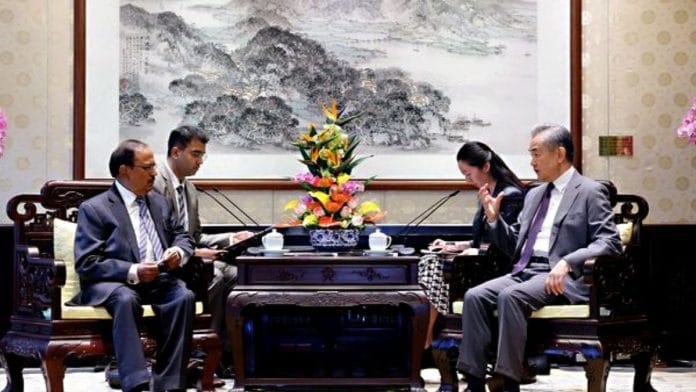New Delhi: India has “areas of dispute” with China on the border and its defence activities, but there are other aspects of the relationship such as trade where New Delhi and Beijing are continuing to cooperate, said National Security Adviser (NSA) Ajit Doval Friday.
Speaking at the 6th Sardar Patel Lecture on Governance, India’s NSA said: “China is important. We have areas of dispute on our borders. We have concerns about some of their defence activities. But there are other areas such as trade with them…We are trying to cooperate where we can.”
The remarks come as India and China continue to stabilise ties that ruptured following the military clashes at Galwan in the summer months of 2020.
Doval, who is also India’s Special Representative on the Boundary Question, has led New Delhi’s negotiations with his counterpart Wang Yi over the last decade to find a solution to the long-running boundary dispute. Doval travelled to Beijing last December to meet Wang and hosted the Chinese foreign minister in New Delhi in August as a part of the SR-level talks.
India and China maintained no high-level political contact from the clashes at Galwan until October 2024, when Foreign Secretary Vikram Misri announced that New Delhi and Beijing had reached an agreement to disengage at friction points across the Line of Actual Control (LAC).
Prime Minister Narendra Modi met with Chinese President Xi Jinping on 23 October last year on the margins of the BRICS summit in the Russian city of Kazan. In August this year, Modi travelled to the Chinese city of Tianjin for the SCO Heads of State meeting, where he held a bilateral meeting with Xi.
Also Read: Democracy, non-institutional methods of regime change lead to problems—NSA Ajit Doval
‘Not in support of BRI since day one’
However, despite the growing political thaw, Doval categorically denied any interest within New Delhi to join China’s Belt and Road Initiative (BRI).
“Since day one we have not been in support of the BRI. We have not allowed any part of our territory to be linked with the BRI,” Doval said at the lecture organised by the IC Centre of Governance and the India International Centre.
On the broader spectrum of ties between New Delhi and Beijing, Doval said there is “engagement” across various mechanisms including at the political level, as well as at other levels such as the SR-level talks, Foreign Secretary-Vice Secretary level and other such bilateral mechanisms.
“We are very confident with them. It’s an area of concern and priority for us. But we are not too worried about it,” Doval said.
India and China have taken a number of confidence building measures in the last few months. Beijing restarted the Kailash Mansarovar Yatra this summer, which allowed Indian travellers to make the pilgrimage to the Mansarovar lake in Tibet. India has started issuing tourist visas to Chinese nationals, while direct flights resumed between the two countries earlier this week.
Moreover, regarding India’s other major concern with China—export controls on rare earth elements, critical minerals and magnets—there has been some movement. At least four Indian companies have received export licenses from China, as confirmed by the Ministry of External Affairs Thursday. The last tunnel boring machine has also been dispatched from China for India, German Ambassador Philipp Ackermann confirmed to ThePrint earlier this month, indicating that the trade ties are continuing to grow.
(Edited by Gitanjali Das)






